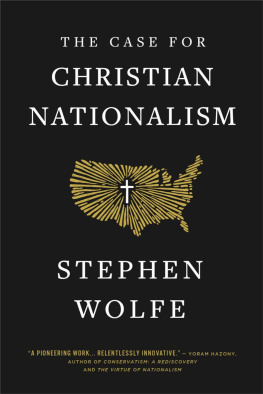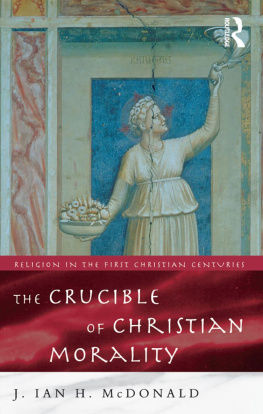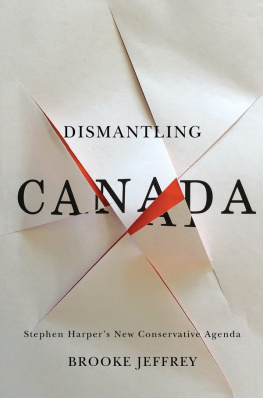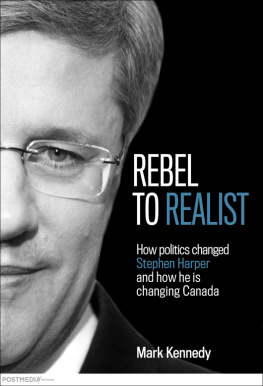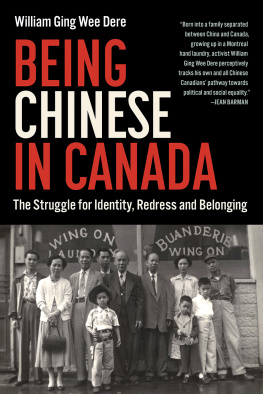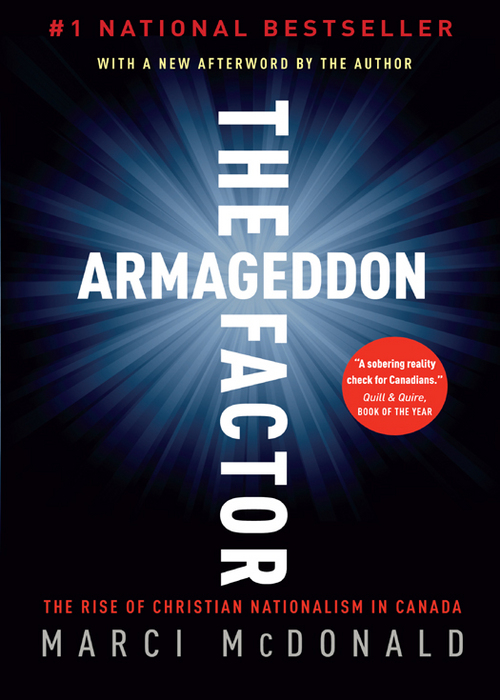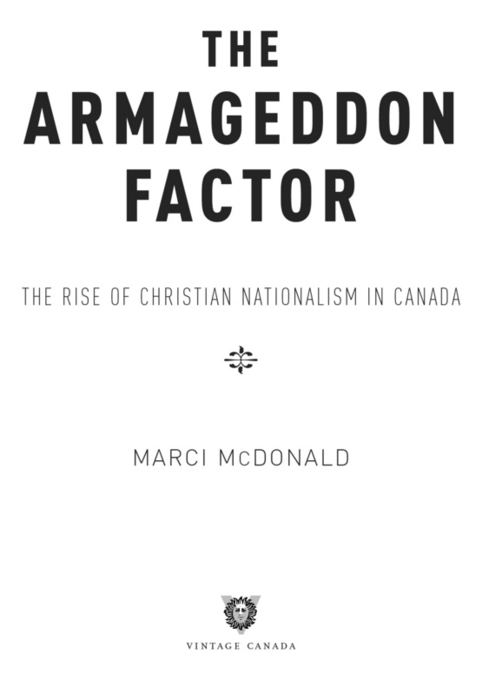VINTAGE CANADA EDITION, 2011
Copyright 2010 Marci McDonald
Afterword 2011 Marci McDonald
All rights reserved under International and Pan-American Copyright Conventions. No part of this book may be reproduced in any form or by any electronic or mechanical means, including information storage and retrieval systems, without permission in writing from the publisher, except by a reviewer, who may quote brief passages in a review.
Published in Canada by Vintage Canada, a division of Random House of Canada
Limited, Toronto, in 2011. Originally published in hardcover in Canada by Random House Canada, a division of Random House of Canada Limited, in 2010. Distributed by Random House of Canada Limited.
Vintage Canada with colophon is a registered trademark.
www.randomhouse.ca
Library and Archives Canada Cataloguing in Publication
McDonald, Marci
The Armageddon factor : the rise of Christian nationalism in Canada / Marci
McDonald.
eISBN: 978-0-307-36788-4
1. Christian conservatismCanada. 2. Christianity and politicsCanada.
3. CanadaPolitics and government2006. I. Title.
FC640.M35 2011 322.10971 C2010-904097-X
Cover design: Terri Nimmo
Cover image: Shuttlecock, Dreamstime.com
v3.1
TO CLAIR
a saint in every sense of the word
CONTENTS
He shall have dominion also from sea to sea,
And from the River to the ends of the earth.
Those who dwell in the wilderness will bow before Him,
And His enemies will lick the dust.
Psalm 72: 89
PREFACE
S he stared at me across the table as if I were out of my mind. A publisher had asked me to write a book on the rise of the Christian right in Canadian politics and, hearing the news, one of my closest friends was questioning my sanity for even contemplating such a task. Why would you want to do that? she asked. Surely, you dont think that it can happen here. This is a profoundly different country than the United States.
To my surprise, she was hardly alone in that view. The book was to be an expansion of an article Id written for the Walrus magazine shortly after Stephen Harper came to power, and in the course of researching it, I would hear the same argument from pundits and professors alike. As George W. Bush and his evangelical base lost their hold on power in the United States, swept into the annals of history on a wave of Obamamania that seemed to overwhelm the continent, commentators on both sides of the border offered up triumphal requiems for the religious right, the three-decade-old movement that had changed the fabric of American politics. In this country, where a new crop of evangelical leaders had begun to echo American rhetoric during the same-sex marriage debate, the elegies were riddled with even greater glee, underscored by an insistence that Canadians could never fall prey to such unseemly extremes of partisan piety.
For me, those dismissals had a familiar ring. During more than a decade in Washington, first as Macleans bureau chief, later as a senior writer for U.S. News & World Report, I had repeatedly heard the same sort of assessments from academics and media analysts: the religious right was finished, kaput, a spent force at the ballot box, its leaders out of touch with the much more acceptable and tempered views of the masses. And each time, without exception, those assessments had been wrong.
When I had landed in the U.S. capital in the midst of Ronald Reagans 1984 re-election campaign, I was intrigued by reports about Jerry Falwells Moral Majority, which was credited with putting a television pitchman in the White House and seemed poised to repeat the feat. It struck me as a singularly exotic phenomenon, unlike anything that existed in Canada or Europe, my previous posting, and, determined to get a fix on it, I headed southwest to Lynchburg, Virginia, where Falwell presided over his twenty-thousand-member flock. Along U.S. Route 29, signs beckoned to storied Civil War battle sites, but it was only much later that I realized I was tracking the first skirmishes in a contemporary civil war unleashed by Falwell and his televangelical counterpartsa culture war that pitted Bible-believing fundamentalists against their mainline Christian brethren, liberal cities against the suburbs, and values voters against those who insisted on a strict separation between church and state.
Pulling up outside the massive white pillars of Falwells Thomas Road Baptist Church, I was stunned to find a parking lot large enough for a mid-sized shopping mall jammed for a weeknight service. It was my first encounter with the role that megachurches had come to play in American life, doubling as de facto town squares for a sprawling exurban population adrift amid the alienating asphalt and strip malls that blanket the landscape.
It was also my introduction to a scriptural scenario Id never heard back in Ontarios mainline Protestant pews. Slipping into a seat near the front of Falwells immense blue-broadloomed sanctuary, I listened, enthralled, to the thunderous baritone he had honed to theatrical effect on the Old-Time Gospel Hour as he related his version of the Rapturethat mythic moment when some born-again Christians expect to be snatched up to salvation before the Battle of Armageddon. Only a single verse in St. Pauls first epistle to the Thessalonians hints at that apocalyptic plotline, but Falwell had no hesitation about fleshing it out in vivid, updated detail. The divine summons, he counselled, could ambush the faithful anytime, anywhere. No matter what believers were doingeven speeding along the highway at rush hourthey could find themselves suddenly wafting heavenward. Today, at the mere mention of the Rapture, Falwells sermon flashes through my mind: driverless cars careening out of control in a cosmic expressway pileup.
As it turned out, I wasnt the only one captivated by his imagery. More than a decade later, San Diego pastor Timothy LaHaye and his writing partner, Jerry Jenkins, released Left Behind, the first of their best-selling potboilers depicting life on earth in the wake of the Rapture, which opens with exactly that scene of global traffic mayhem. A longtime pal of Falwells, LaHaye had been one of the Republican strategists who devised the notion of tapping into evangelical discontent to expand the partys base, and then christened the resulting constituency the Moral Majority. But it was later in his Left Behind novels that he provided the rationale for the Christian rights sense of urgency about effecting political changethe conviction that, with Armageddon looming, the faithful have not a moment to lose in preparing the way for the Second Coming of Christ.
By the end of Reagans presidency, some of Americas star televangelists had been caught out in sex scandals that reduced them to the archetypes of hypocrisy once immortalized by Sinclair Lewis in Elmer Gantry. Falwell himself felt obliged to dissolve the Moral Majority and commentators lost no time in declaring the religious right historyan electoral flash in the pan ignited by Reagans evil-empire rhetoric, which had finally run out of both enemies and credibility. But the ink was barely dry on those death notices when the media woke up to the news that Pat Robertson, the Christian Broadcasting Network mogul, had emerged as the wild card in the 1988 presidential race. As Robertson stormed the South, the panic within Republican circles was palpable: the


